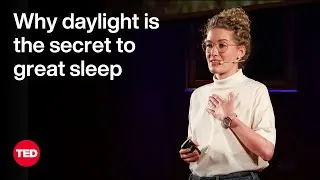What the Discovery of Exoplanets Reveals About the Universe | Jessie Christiansen | TED
46,416 views ・ 2023-01-12
請雙擊下方英文字幕播放視頻。
譯者: Winston Chung
審譯者: Shelley Tsang 曾雯海
00:04
I am a planet hunter
0
4292
1794
我是個行星獵人
00:06
and keeper of the keys
at NASA's Exoplanet Archive.
1
6127
3379
也是NASA(美國太空總署)
太陽系外行星檔案保管鑰匙的人。
00:10
In March 2022, we reached
a major milestone in space exploration:
2
10340
5380
在2022年3月,我們達到
太空探險的一個主要的里程碑:
00:16
5,000 known exoplanets.
3
16596
2086
5000個已知的系外行星。
00:20
For thousands of years,
4
20141
1293
幾千年來,
00:21
we've wondered about planets
outside of our solar system,
5
21476
3295
我們一直都想知道太陽系外的行星,
00:24
now called exoplanets.
6
24771
1835
現在稱為系外行星。
00:26
But our technology only recently
caught up with our imaginations.
7
26606
3921
但是我們的科技直到最近
才趕上我們的想像力。
00:30
And yes, 5,000 planets is incredible.
8
30527
3879
是的,5000個行星是很驚人的。
00:34
What's even more incredible
9
34406
1710
更驚人的是
00:36
is how space research
will change as a result.
10
36116
3044
這結果將如何改變太空研究。
00:40
When I started grad school,
11
40870
1544
當我開始讀研究所時,
00:42
there were about 100 known exoplanets,
12
42455
2461
有100個已知的系外行星,
00:44
all radically different
from the Earth and from each other.
13
44958
3337
每個都和地球截然不同,
而且它們彼此也截然不同。
00:48
I was determined to find more.
14
48336
1752
我下決心要找到更多。
00:51
I spent four years looking
at nearly 87,000 stars, one by one.
15
51006
4713
我花了4年觀測幾乎87000個星球,
一個一個看。
00:56
Now you might have this romantic idea
16
56595
1835
也許你會浪漫地想
00:58
that I was gazing intently
through a telescope,
17
58471
2211
我用望遠鏡仔細地觀察,
01:00
pondering some gorgeous view
of the universe.
18
60974
2502
琢磨一些宇宙的美景。
01:03
I was not.
19
63518
1543
我不是。
01:05
I was looking at data like this,
20
65103
1960
我是看像這樣的數據,
01:07
measuring the brightness
of each star over time.
21
67063
2503
衡量每個星球在不同時間的亮度。
01:10
If the brightness dipped, just briefly,
just a little bit,
22
70358
3837
如果亮度只有在短時間
減低了只有一點,
01:14
it could be because a planet
had orbited in front of that star,
23
74195
3838
那可能是因為有一顆行星
從這星球前面運行過去,
01:18
blocking some of the light
from reaching my telescope.
24
78033
2877
擋住了一些射向我們望遠鏡的光線。
01:20
So I spent four years looking
for decimal-level changes in these data.
25
80910
4338
所以我花了4年看這些數據裡
小數點以下的改變。
01:25
And after four years, I'd found ...
26
85290
1877
經過4年後,我找到
01:27
nothing.
27
87876
1501
什麼都沒有。
01:29
Zero exoplanets.
28
89419
1293
零顆系外行星。
01:31
Thankfully, they still gave me the PhD,
I think, for effort.
29
91838
3128
很感謝地,他們仍然頒發博士學位給我,
我想,為了獎勵我的努力。
01:35
(Laughter)
30
95008
2336
(笑聲)
01:37
Then I moved to Harvard, where I worked
on my first NASA mission, called EPOXI.
31
97385
4129
然後我搬到哈佛從事我第一個
太空總署的任務,叫做EPOXI。
01:42
I still didn't find any exoplanets.
32
102307
1835
我仍然沒有發現任何系外行星。
01:45
Then in March 2010,
I joined the Kepler Mission,
33
105060
3086
然後在 2010 年 3 月
我參加開普勒任務,
01:48
NASA's grand experiment
34
108146
1502
那是太空總署的超大型試驗
01:49
with putting one of our planet-hunting
instruments into space.
35
109648
2919
把其中一個追蹤行星的儀器放到太空。
01:53
Monday was my first day
on the base in Silicon Valley.
36
113443
3629
星期一是我在矽谷基地
第一天上班。
01:57
It was mostly spent in HR.
37
117072
1626
大部分時間都花在人事作業。
01:59
Tuesday, I sat down and looked
at the data for the first time,
38
119407
3796
星期二,我第一次坐下來
研讀那些數據,
02:03
and I found my first exoplanet.
39
123203
1710
我發現了我的第一個系外行星。
02:05
(Cheers)
40
125455
1251
(歡呼)
02:06
(Applause)
41
126748
3253
(鼓掌)
02:10
A few minutes later, I found another one.
42
130085
2085
過了幾分鐘,我找到另外一個。
02:14
There's a saying that we're the generation
that was born too late to explore Earth
43
134047
5714
曾經流傳一句話,
我們這一代要去探險地球生得太晚,
02:19
and too soon to explore space.
44
139803
2460
但要去探險太空卻生得太早。
02:22
That's not true anymore.
45
142514
2169
這句話不再是真的。
02:24
That day and every day since,
I've gotten to explore space.
46
144724
3963
從那一天起和之後的每一天,
我都在探險太空。
02:29
Kepler made it possible for us
47
149437
1669
開普勒讓我們能夠
02:31
to measure stellar brightness
much more precisely
48
151106
2836
遠比以前更精準地衡量
星球的亮度。
02:33
than we had before.
49
153942
1293
02:35
And eventually I helped find
thousands of exoplanets.
50
155235
3503
終於我幫助找到上千的系外行星。
02:38
And we've really only searched
our local corner of the galaxy
51
158738
2962
而且我們只是在我們銀河系裡
鄰近的角落找到這些行星。
02:41
to find those planets.
52
161700
1501
02:43
That means there's likely tens of billions
of planets just in our Milky Way.
53
163201
4338
這意味著在我們所屬的銀河
就可能有幾百億顆行星。
02:48
Now with so much data,
54
168665
2002
現在我們有這麼多數據,
02:50
we can start sorting and grouping
and categorizing these planets
55
170709
3294
我們可以開始把這些行星
整理分類找到特性和趨勢。
02:54
to find trends.
56
174045
1794
02:55
Think of it this way:
57
175880
1627
用個比喻去了解:
02:57
if you wanted to learn about dogs
and you had five dogs in your study,
58
177549
4004
如果你想研究狗
而你有五隻狗可供研究,
03:01
well, you'd learn a lot
about those five dogs.
59
181594
2628
你就學到很多有關這五隻狗的事。
03:04
That they're all good dogs.
60
184264
1626
它們都是好狗。
03:05
But maybe not about dogs in general.
61
185932
2211
但是不見得是對一般狗都適用。
03:08
If you had 5,000 dogs in your study,
62
188184
2836
如果你有 5000 隻狗可研究,
03:11
then you’d start to see that there were
German Shepherds and Dobermanns
63
191062
4421
你就開始看到有德國牧羊犬,
杜賓犬和小獵犬,
03:15
and beagles,
64
195483
1293
03:16
and that these different breeds
have different features.
65
196776
2836
而這些不同種類的狗
有不同的特徵。
03:19
With demographic-level data on exoplanets,
66
199612
2336
有了系外行星基本屬性的數據,
03:21
we can start asking some
of these big questions for the first time,
67
201948
3921
我們開始能問一些比較大的問題,
03:25
like: Of those thousands and billions
of planets in our galaxy,
68
205869
4045
像:我們銀河系裡幾千幾億的行星裡,
03:29
how many are like the Earth,
or like Jupiter?
69
209956
3128
有多少是像地球,或像木星?
03:33
How many planets does a typical star have?
70
213793
2378
一個恆星通常有幾個行星?
03:36
Can a planet orbit more than one star?
71
216921
2336
一個行星能繞行多於一個星星嗎?
03:39
Yes.
72
219299
1251
能的。
03:40
Can a planet exist
without any star at all?
73
220592
2460
一個行星沒有恆星能存在嗎?
03:43
Also yes.
74
223094
1043
也能。
03:44
One surprising result
from the study of planet populations
75
224888
3879
從這行星分佈研究得到
一個令人驚訝的結果
03:48
is that the most common
kind of planet in our galaxy
76
228808
3087
就是在我們的銀河最常見的行星
03:51
might be one we don’t have
in our solar system:
77
231936
2920
可能是我們在太陽系沒有的:
03:54
a super-Earth up to twice as big
and ten times as heavy as our Earth.
78
234856
5756
一個比地球兩倍大
而十倍重的超級地球。
04:00
We've found evaporating planets,
disintegrating planets,
79
240612
3795
我們曾發現正在蒸發的行星,
正在解體的行星,
04:04
planets clustered together
in a clockwork dance,
80
244407
2878
聚集在一起有規律地跳舞的行星,
04:07
ultra-puffy planets, ultra-dense planets.
81
247285
3378
極端鬆散的行星,極端緊密的行星。
04:10
It's truly a wild and wonderful menagerie
82
250705
2503
我在太空總署收集的系外行星檔案
實在是荒野而奇妙的展覽場。
04:13
that I get to corral
at the NASA Exoplanet Archive.
83
253416
2544
04:16
But it gets even more
interesting than that.
84
256878
2586
有趣的不止於此。
04:19
With so much data,
we might finally be able
85
259506
2627
有了這麼多數據,我們可能終於能
04:22
to figure out how planets are made.
86
262175
2252
明白行星是如何形成的。
04:25
We see baby stars
being born in stellar nurseries
87
265553
3796
我們看到嬰兒星星在
恆星的育嬰室出生
04:29
surrounded by dust and gas.
88
269390
2086
有灰塵和氣體環繞。
04:31
And we see all the stars surrounded
by completed planetary systems.
89
271518
3920
我們看到很多星星有
完整的行星系統圍繞著它們。
04:35
But we still don't really know
what happens in between.
90
275438
3087
但是我們仍然不明白
這兩者之間發生了什麼事。
04:38
With more data, we might find planets
91
278525
1835
有了更多的數據,
我們可能發現一些行星
04:40
at some middle stage
or many middle stages.
92
280360
2794
在兩者之間的
一個或許多階段。
04:43
And from there, be able to map out
a timeline of planetary development.
93
283154
4588
從那裡,我們可能可以推導
行星隨時間的演化。
04:47
What triggers these diffused clouds
of dust and gas to collapse and transform?
94
287742
5255
什麼事使這些游離的灰塵和氣體雲
聚集起來而有轉變?
04:53
And how does the chaos
and turmoil of dust become pebbles,
95
293039
4296
這些散漫混亂的灰塵如何變成小石頭,
04:57
and pebbles become boulders,
and boulders become planetesimals?
96
297377
3545
然後小石頭變成巨石,
而巨石變成板塊?
05:00
And from there,
97
300964
1293
而且從那裡,
05:02
after an intense series of bombardments
98
302298
2461
經過一系列的撞擊
05:04
eventually settle
into an ordered series of planets.
99
304801
3211
終於穩定形成有規律的行星系。
05:08
How often is one
of those planets solid and warm,
100
308763
3837
有多常見到一個行星是固態而溫暖,
05:12
with a water ocean lapping a sandy shore?
101
312642
2586
有水的海洋接連沙灘海岸?
05:16
Where do we come from,
and how did we get here?
102
316187
2670
我們哪裡來的,怎麼來到這裡?
05:20
The more we learn about exoplanets,
103
320608
1835
我們學到愈多關於系外行星的事,
05:22
the easier it is
to target the ones we want.
104
322443
2711
我們就更容易專注我們要的目標。
05:25
So far, we haven't found any planets
that are like the Earth.
105
325154
3713
到目前為止,我們還沒有找到
像地球一樣的行星。
05:28
But I hope we will.
106
328867
1876
但我希望我們會找到。
05:30
NASA just spent the last few years
107
330743
1752
太空總署在過去這幾年
05:32
studying the idea
of a very large telescope in space
108
332495
3587
一直在研究一個想法
要把一個非常大的望遠鏡放在太空
05:36
with next-generation technology
that would allow us to take an image,
109
336124
4171
用新世代的科技可以直接
05:40
an actual photograph,
of a planet like the Earth.
110
340336
3003
為像地球一樣的行星照相。
05:44
With that photo, we could search
for biomarkers, signatures of life.
111
344132
4880
有了相片,我們可以尋找生物特徵,
生命的跡象。
05:49
I'll probably spend the rest of my career
working on that mission.
112
349053
3462
我可能會把我往後所有的工作生涯
都投入那個任務。
05:52
I hope I get to take that photo.
113
352557
2127
我希望我有機會可以照那照片。
05:54
Thank you.
114
354726
1251
謝謝。
05:56
(Applause)
115
356019
1626
(掌聲)
New videos
Original video on YouTube.com
關於本網站
本網站將向您介紹對學習英語有用的 YouTube 視頻。 您將看到來自世界各地的一流教師教授的英語課程。 雙擊每個視頻頁面上顯示的英文字幕,從那裡播放視頻。 字幕與視頻播放同步滾動。 如果您有任何意見或要求,請使用此聯繫表與我們聯繫。







